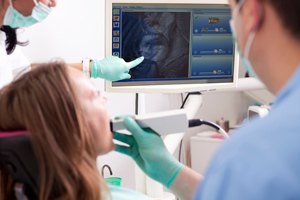By Laura Thill
With advances in technology, dental assistants must be prepared to play an instrumental role in the practice.
 Continual advances in technology, a growing focus on improving the patient experience and achieving best possible outcomes has impacted the role of dental assistants. “Dental assistants today require a much broader base of knowledge than in the past,” says Tim Whitaker, DMD, Marquee Dental Partners. Not only must they understand different materials and how they interact with other substances, they need advanced knowledge and training to stay on top of new technology, he points out.
Continual advances in technology, a growing focus on improving the patient experience and achieving best possible outcomes has impacted the role of dental assistants. “Dental assistants today require a much broader base of knowledge than in the past,” says Tim Whitaker, DMD, Marquee Dental Partners. Not only must they understand different materials and how they interact with other substances, they need advanced knowledge and training to stay on top of new technology, he points out.
“Regardless of whether they are working in a stand-alone practice or a dental service organization (DSO), dental assistants have three key responsibilities,” says Whitaker.
- First, their job is to provide a clear working field for the dentist in a timely manner, with minimum discomfort to patients and resulting in a quality restoration.
- Second, they must educate and relax patients by explaining the treatment that’s to be provided, as well the value of additional treatments needed.
- Third, dental assistants must be instrumental in providing a safe, clean environment for patients.
Mastering new technology
Patient care is a top priority for the entire dental team, dental assistants included. But technologies such as digital X-ray, chairside printing and 3D milling require specialized knowledge and education, according to Whitaker. “Mastering new technologies and techniques requires advanced training, including both classroom and hands-on training,” he says. While this may eat into the time dental professionals can spend chairside, continuing education is a must, not an option, he adds. Once new technology and techniques are mastered, the dental team can work more efficiently, resulting in greater office productivity, decreased chair time, better patient results and less stress for both patients and staff.
Greater demands
That dental assistants today are asked to work with more sophisticated technology and play a bigger role in the operatory is a testimony to their value to the industry. But greater responsibility means enhanced training to prepare for the position. “Dental assistants today work with much more technically advanced equipment, which assistants could not even imagine 10 years ago,” says Whitaker. “As a result, they must be more highly educated and involved than ever before.
“It’s particularly helpful for dental assistants to have a basic understanding of drugs used in the dental office for local anesthesia and sedation, as well as commonly prescribed medications, over-the-counter drugs and supplements,” he continues. “They also need computer skills for using dental practice management software to enter treatment notes and plans for future treatment.
“Dental assistants must have a clear understanding of the processes required for disinfection and sterilization and be able to prepare the room and equipment in accordance with correct sterilization processes, in order to provide a safe and clean environment for the patient,” he explains. In addition, they must be able to read and understand equipment manuals in order to follow complex and ever-changing infection prevention protocols.
In multiple site group practices and DSOs, dental assistants must adhere to consistent standards and protocols, Whitaker points out. “In order to ensure efficiency, it is important to have standard, consistent protocols within the multiple offices of a DSO,” he says. “This can be achieved by company-wide training.”
It’s also important for dental assistants in DSOs to maintain consistency when ordering supplies, notes Whitaker. “In solo practices, the dental assistant can simply talk to the dentist and together they can decide on materials, quantities and the best time to place an order,” he says. “In a DSO, there are firm budgets with specific formularies, making coordination and communication among offices especially important.
“A decade ago, we could not have predicted the technology and treatment innovations that have reshaped the role of the dental assistant,” says Whitaker. “Mastering these advances will continue to require additional training and an investment in materials – both in school and through continuing education.
“Regardless of what changes in technology occur in the future, the dental assistant will continue to play an instrumental role in the dental practice, ensuring patients are comfortable, educated and safe,” he says. Moving forward, dental assistants will play a greater and greater role in helping dentists be more productive and effective, he notes. “As such, there will always be a demand for well-trained, proficient dental assistants, and I believe that need will continue to grow in the years ahead.”




